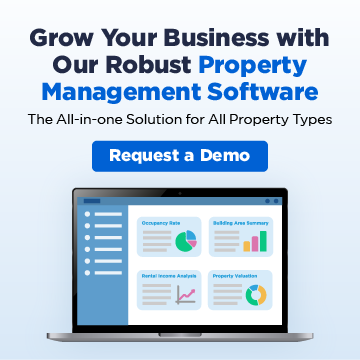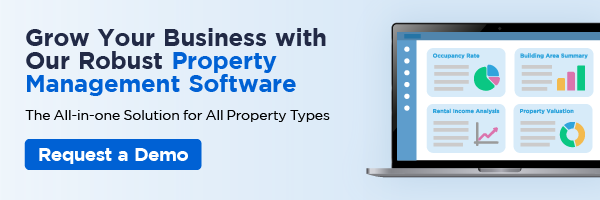Environmental, Social and Governance (ESG) factors have become key considerations for stakeholders and shareholders alike to evaluate an organization’s environmental and social impact, as well as its sustainability and value. 86% of investors believe that a focus on ESG in business strategy helps drive long-term shareholder value, according to a report by PwC. As ESG continues to shape organizations’ business practices and agendas across all industries, in particular, the real estate companies which have a significant impact on the environment and social welfare, implementing ESG practices into decision-making processes is imperative.
It is worth noting that ESG initiatives are not the only important aspect; reporting that discloses tangible and measurable ESG outcomes to the public is also crucial. From collecting ESG data to generating insights, leveraging technology is inevitable. To achieve ESG goals and business sustainability, today’s commercial real estate organizations need to embark on the journey of digital transformation.
Why is ESG Important for the Commercial Real Estate Sector?
Buildings account for about 90% of electricity consumption and 60% of greenhouse gas emissions in Hong Kong* . As one of the high carbon-emitting industries, real estate companies have a vital role to play in improving energy efficiency and decarbonization of existing buildings and the construction of new ones to achieve goals for a sustainable future. Put simply, it is necessary for the Commercial Real Estate Industry to embrace ESG practices.
Making commitments to the environment, however, is not just Corporate Social Responsibility (CRS). In fact, taking ESG into account in every aspect of management can help maximize an organization’s bottom line due to increasing electricity costs, and foster greater corporate resilience – the capability of absorbing shock and recovering – as organizations can identify risks that may affect business sustainability through ESG strategies.
In addition, due to growing concern over sustainability, the government continues developing and tightening ESG legislation and regulations, which means integrating ESG into business will no longer be an option but mandatory for real estate companies – and organizations across all industries. It implies that the earlier an organization prioritizes ESG, the greater the financial returns it will enjoy.
Net Zero Commercial Real Estate through Smart Building Technologies
Sustainability goes hand in hand with digital transformation since ESG is data-driven. When it comes to decarbonization in the Commercial Real Estate Sector – a major contributor to climate change, Net Zero that features as a key component of ESG is always the ultimate goal, and it can be achieved by leveraging smart building technologies such as Internet of Things (IoT) solutions.
The transition from “green buildings” to “Net Zero buildings” focuses on reducing energy consumption, replacing fossil fuels with carbon-free sources, increasing energy efficiency, and so on, throughout the whole lifetime of buildings. All these initiatives require progressive and continuous efforts, along with IoT technologies. Such solutions can monitor energy usage, identify energy inefficiencies, make automatic optimizations and facilitate informed decision-making, resulting in lower operational costs and better ESG performance. For instance, IoT solutions enable smart lighting in buildings, managing light sensors and determining the optimal use of energy at certain times of the day.
Optimizing ESG Reporting with Property Management Software
Stakeholders and shareholders demand transparency on organizations’ ESG metrics nowadays. Apart from operating Net Zero buildings, digital transformation is also key to data availability – an essential part of ESG reporting as solid data provides the fundamentals of executing ESG Strategies so as to accelerate ESG goals.
Leveraging Enterprise Resource Planning (ERP) Solutions such as Property Management Software (PMS) can help real estate companies automate and validate data, reducing the need for manual data entry to ensure the accuracy of business operation and ESG data. PMS can also help companies track and analyze their ESG data with occupation rate and rental performance, then provide a holistic insight that assists them in identifying potential risks and opportunities, and areas of improvement.
Conclusion
By implementing smart building technologies, and embedding ESG considerations into every stage of the property lifecycle, from due diligence to acquisitions and from leasing to asset management, real estate companies can reduce their environmental impact, address ESG issues and accelerate business sustainability. As a leading property management software and services provider, we aim to provide robust and innovative solutions to the Commercial Real Estate Industry to assist them in achieving ESG goals, and work together with the communities to build a livable city and a sustainable future.
*Hong Kong’s Climate Action Plan 2030+
Image by Freepik

GaiaPM, a member of the FlexSystem Group, provides international lease and property management software designed to help you drive performance up and costs down. As a global solutions provider in over 38 countries GaiaPM, together with its proven solutions for multi-currency financials, human resources, and operations, is a business software vendor to 1 in 10 Forbes Global 2000 (May 2020), and 1 in 5 Global Fortune 500 (August 2020), operating at the intersection of new digital process and payment technologies, whether on-premise, hybrid or cloud, to provide you with iterative opportunities for value creation.




